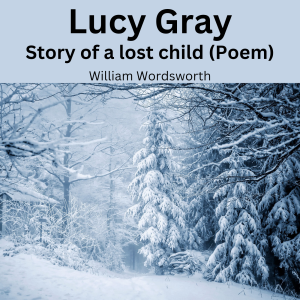Lucy Gray

“Lucy Gray” is a poignant and haunting poem that captures the essence of a lost child amidst the winter landscape.
This melancholic piece explores themes of innocence, solitude, and the fleeting nature of life.
Through vivid imagery and a sense of ghostly presence, the poem evokes a sense of sorrow and longing, leaving a lasting impression on readers.
“Lost in the Winter’s Embrace: Reflecting on the Enchanting ‘Lucy Gray’ Poem”.
In the vast realm of classic poetry, one work that stands out for its haunting beauty is William Wordsworth’s “Lucy Gray.” This introspective piece paints a vivid picture of a lost child, entwined with the mystical allure of winter.
Through evocative imagery and poignant themes, Wordsworth’s words transport us to a world of innocence, solitude, and ephemeral memories.
The Winter Land
Firstly, Wordsworth’s masterful use of imagery immerses us in the wintry landscape.
As we traverse the poem’s stanzas, we find ourselves following the ghostly footsteps of Lucy Gray through snow-covered fields and ethereal woods.
Fragility of Life
Moreover, the poem explores the theme of loss and the fragility of life.
Lucy Gray’s untimely departure tugs at our heartstrings, leaving us pondering the transience of our own existence.
Lingering Presence
Lastly, the lingering presence of Lucy Gray as a spectral figure adds an eerie layer to the poem.
Her absence is palpable, leaving behind a sense of melancholy and yearning that resonates with readers.
Conclusion:
“The Poem” captures the essence of both the beauty and melancholy of the human experience.
Through Wordsworth’s poetic mastery, we are transported to a winter’s landscape where innocence meets loss, and where the echoes of a lost child continue to haunt our thoughts.
This enduring poem serves as a reminder of the fleeting nature of life and the power of poetry to evoke deep emotions and introspection.
Question and Answer of the Poem:
Q: What is the central theme of the poem “Lucy Gray”?
A: The central theme of the poem “Lucy Gray” is the loss of innocence and the power of nature.
Q: Who is Lucy Gray?
A: Lucy Gray is a young girl who lives in a rural area.
Q: What happens to Lucy Gray in the poem?
A: Lucy Gray goes out into the snowstorm and gets lost.
More Question with Answers:
Q: How does She get lost?
A: Lucy Gray gets lost in the snowstorm while trying to find her way home from her father’s cottage.
Q: What role does nature play in the poem?
A: Nature plays a significant role in the poem. It is portrayed as both beautiful and dangerous, as it is the snowstorm that leads to Lucy Gray’s disappearance.
Q: How does the poem explore the loss of innocence?
A: The poem explores the loss of innocence through Lucy Gray’s disappearance and the sorrow felt by her parents. It depicts the vulnerability of children and the harsh reality of the world.
Q: What emotions does the poem evoke?
A: The poem evokes a sense of sadness, loneliness, and the fragility of life. It also elicits a feeling of wonder at the power and beauty of nature.
Q: What is the overall message or lesson of the poem?
A: The overall message of the poem is that nature can be both captivating and dangerous, and the loss of innocence is a tragic aspect of human existence.
Q: How does the poem use imagery to convey its message?
A: The poem uses vivid imagery to depict the snowy landscape and the haunting image of her footsteps disappearing in the snow.
This imagery reinforces the theme of the loss of innocence and the power of nature.
Q: What is the tone of the poem?
A: The tone of the poem “Lucy Gray” is melancholic and reflective. It conveys a sense of sadness and loss.
Q: Does the poem have a happy ending?
A: No, the poem does not have a happy ending. She remains lost in the snowstorm, and her fate is uncertain.
Another Set of Questions:
Question 1: What is the main theme of the poem “Lucy Gray”?
Answer: The main theme of the poem “Lucy Gray” is the power and beauty of nature, and the profound effect it can have on human emotions and experiences.
It also explores themes of loss, innocence, and the transient nature of life.
Question 2: Who is Lucy Gray in the poem?
Answer: Lucy Gray is the central character of the poem. She is a young girl who lives with her parents in a remote cottage near the mountains.
Lucy is portrayed as a lively and cheerful child, deeply connected to nature and the surrounding landscape.
Question 3: What happens to Lucy Gray in the poem?
Answer: In the poem, Lucy Gray wanders off into a snowstorm one evening, despite her parents’ warnings. She is subsequently lost and never returns.
t is implied that she perishes in the storm, but her body is never found.
Question 4: How do Lucy Gray’s parents react to her disappearance?
Answer: Lucy Gray’s parents are distraught and grief-stricken when they realize she is missing.
They search for her frantically, calling out her name and looking for any signs of her.
However, they are unable to find her and are left devastated by her disappearance.
Question 5: What is the significance of the final lines, “And, when I am on horseback, / I always see Lucy Gray”?
Answer: The final lines of the poem suggest that Lucy Gray’s spirit or presence lingers in the natural world, even after her physical demise.
More Questions
The speaker, who may be Lucy’s father or someone familiar with her story, claims to see her when riding on horseback, implying a spiritual connection between Lucy and the natural surroundings she loved.
It conveys the idea that her memory and essence remain intertwined with the beauty of nature.